上海版牛津英语六年级上unitunit课本解析
- 格式:docx
- 大小:14.68 KB
- 文档页数:5
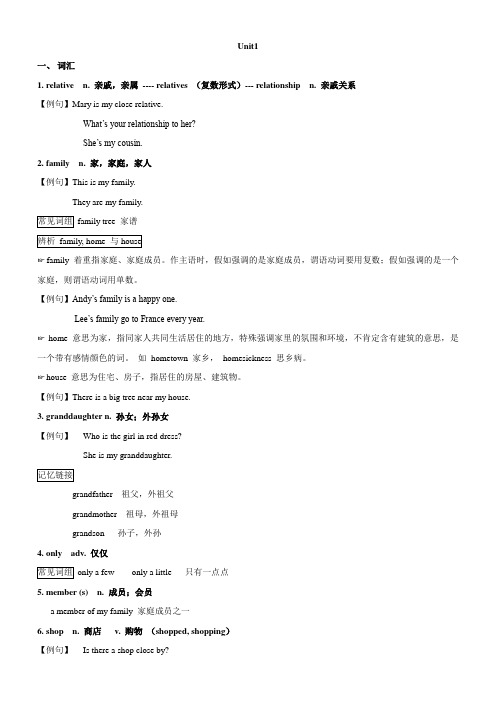
Unit1一、词汇1.relative n. 亲戚,亲属---- relatives (复数形式)--- relationship n. 亲戚关系【例句】Mary is my close relative.--- What’s your relationship to her?--- She’s my cousin.2.family n. 家,家庭,家人【例句】This is my family.They are my family.family tree 家谱☞ family 着重指家庭、家庭成员。
作主语时,假如强调的是家庭成员,谓语动词要用复数;假如强调的是一个家庭,则谓语动词用单数。
【例句】Andy’s family is a happy one.Lee’s family go to France every year.☞home 意思为家,指同家人共同生活居住的地方,特殊强调家里的氛围和环境,不肯定含有建筑的意思,是一个带有感情颜色的词。
如hometown 家乡,homesickness 思乡病。
☞ house 意思为住宅、房子,指居住的房屋、建筑物。
【例句】There is a big tree near my house.3. granddaughter n. 孙女;外孙女【例句】--- Who is the girl in red dress?--- She is my granddaughter.grandfather 祖父,外祖父grandmother 祖母,外祖母grandson 孙子,外孙4. only adv. 仅仅only a few only a little 只有一点点5. member (s) n. 成员;会员a member of my family 家庭成员之一6. shop n. 商店v. 购物(shopped, shopping)【例句】--- Is there a shop close by?--- Yes, there is a big shop on the right.--- I want to go shopping tomorrow.--- I’ll go with you.bookshop 书店shopping bag 购物袋shopping centre 购物中心shopping mall 大型购物商场go shopping 去购物= do some shopping 【例句】I have to go shopping this afternoon.= I have to do some shopping this afternoon. 7. else adv. 别的,其他的【例句】--- What else do you want?--- Nothing else, thank you.someone/anybody/nobody elsenothing/something/anything elsewho elsewhere elsewhat else?who else? 强调还有什么/谁...?8. badminton n. 羽毛球【例句】Tom likes playing badminton.play + 球类运动【例如】play tennis 打网球play table tennis 打乒乓球play football 踢足球play volleyball 打排球9. cycle n. 自行车v. 骑自行车【例句】They want to go there by cycle.He cycles to work every day.cycle 作名词时还有周期、循环的意思。
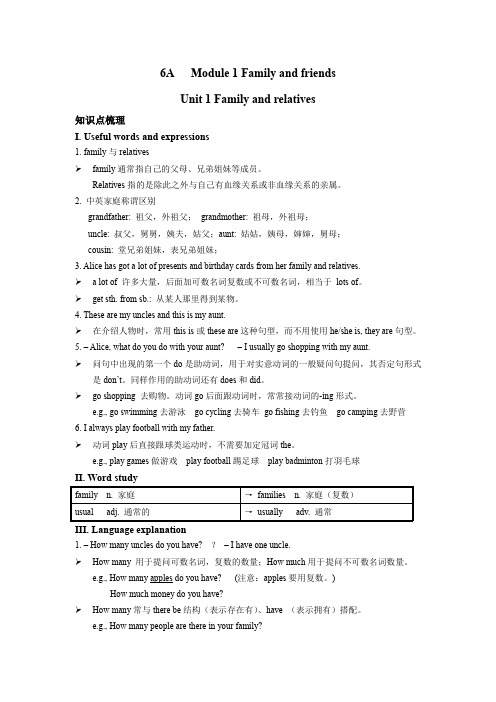
6A Module 1 Family and friendsUnit 1 Family and relatives知识点梳理I. Useful words and expressions1. family与relativesfamily通常指自己的父母、兄弟姐妹等成员。
Relatives指的是除此之外与自己有血缘关系或非血缘关系的亲属。
2. 中英家庭称谓区别grandfather: 祖父,外祖父;grandmother: 祖母,外祖母;uncle: 叔父,舅舅,姨夫,姑父;aunt: 姑姑,姨母,婶婶,舅母;cousin: 堂兄弟姐妹,表兄弟姐妹;3. Alice has got a lot of presents and birthday cards from her family and relatives.a lot of 许多大量,后面加可数名词复数或不可数名词,相当于lots of。
get sth. from sb.: 从某人那里得到某物。
4. These are my uncles and this is my aunt.在介绍人物时,常用this is或these are这种句型,而不用使用he/she is, they are句型。
5. – Alice, what do you do with your aunt? – I usually go shopping with my aunt.问句中出现的第一个do是助动词,用于对实意动词的一般疑问句提问,其否定句形式是don’t。
同样作用的助动词还有does和did。
go shopping 去购物。
动词go后面跟动词时,常常接动词的-ing形式。
e.g., go swimming去游泳go cycling去骑车go fishing去钓鱼go camping去野营6. I always play football with my father.动词play后直接跟球类运动时,不需要加定冠词the。
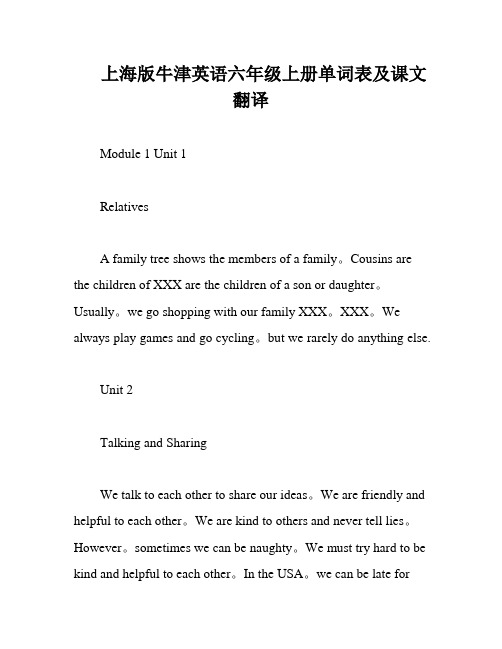
上海版牛津英语六年级上册单词表及课文翻译Module 1 Unit 1RelativesA family tree shows the members of a family。
Cousins are the children of XXX are the children of a son or daughter。
Usually。
we go shopping with our family XXX。
XXX。
We always play games and go cycling。
but we rarely do anything else.Unit 2Talking and SharingWe talk to each other to share our ideas。
We are friendly and helpful to each other。
We are kind to others and never tell lies。
However。
sometimes we can be naughty。
We must try hard to be kind and helpful to each other。
In the USA。
we can be late forappointments。
but we should always be kind and helpful。
We should be XXX.Unit 3XXXWe spend our weekends visiting places like the Summer Palace。
the Palace Museum。
Tiananmen Square。
the Great Wall。
and the Temple of Heaven。
We take photographs of these XXX。
We plan our trips and have many ideas about where to go next。

Module 1 Getting to know each otherUnit 1 Growing upTeaching Aims(教学目标):知识目标:1.能听、说、读、写本课的核心词汇:month, cute, pretty, handsome, catch2.能熟练掌握核心句型:She was two months old.She was small and cute.Her hair was short and her eyes were big.能力目标:1.能听懂对Sally不同成长阶段年龄和特征的描述。
2.能综合运用所学语言描述人在不同成长阶段的情况。
情感目标:对所学内容能主动联系生活实际,能尽量用英语交流,培养学生的小组合作精神。
Teaching Importances and Difficulties (教学重难点):1.能在语境中运用本课的核心词汇和句型。
2.在句型His/her...was/were... 中根据名词的单复数形式正确使用was或were.Teaching Tools(教学用具):录音机、自制课件、照片等Teaching Procedures(教学过程):StepⅠ.Warm up and revision(热身与复习)1. Greetings.2. Do some warming-up exercises.3. Review the numbers.Step Ⅱ.Presentation and practice(呈现新语言知识和练习)1. Lead in.T: How old are you?S1: I’m eleven years oldT: You’ll be twelve years old next year. You’re growing up.2. Show some photos and introduce the new words.3. Learn to say and use the words.4. Talk about the photos of Sally.5. Watch the screen and learn to say the sentences.6. Ask pupils to practise in groups.Sept Ⅲ. Learn the story (学习课文)1. Read the story and learn to say the useful sentences.2. Watch the cartoon.Module 1 Getting to know each otherUnit 2 My summer holidayTeaching Aims(教学目标):1.能听、说、读、写本课的核心词汇:famous, during, spend, everyone,countryside2.能熟练掌握核心句型:How was your summer holiday?It was wonderful. We went to the Great Wall.Everyone had a good time.3.读懂有关暑假生活的对话,学会询问别人和介绍自己的暑假生活。
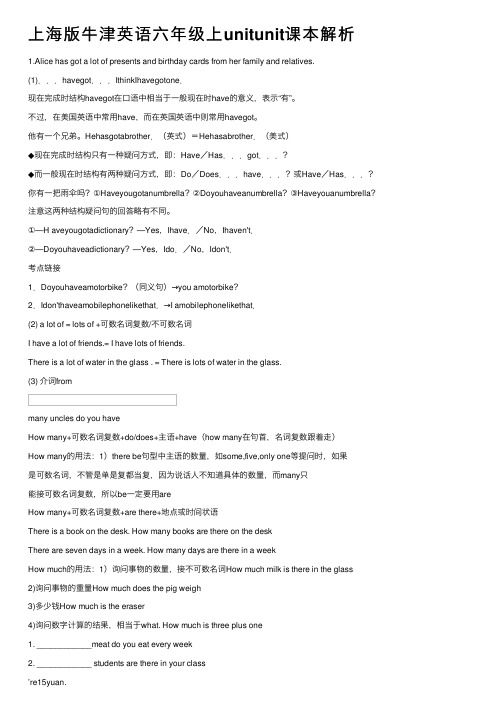
上海版⽜津英语六年级上unitunit课本解析1.Alice has got a lot of presents and birthday cards from her family and relatives. (1)...havegot...IthinkIhavegotone.现在完成时结构havegot在⼝语中相当于⼀般现在时have的意义,表⽰“有”。
不过,在美国英语中常⽤have,⽽在英国英语中则常⽤havegot。
他有⼀个兄弟。
Hehasgotabrother.(英式)=Hehasabrother.(美式)◆现在完成时结构只有⼀种疑问⽅式,即:Have/Has...got...?◆⽽⼀般现在时结构有两种疑问⽅式,即:Do/Does...have...?或Have/Has...?你有⼀把⾬伞吗?①Haveyougotanumbrella?②Doyouhaveanumbrella?③Haveyouanumbrella?注意这两种结构疑问句的回答略有不同。
①—H aveyougotadictionary?—Yes,Ihave./No,Ihaven't.②—Doyouhaveadictionary?—Yes,Ido./No,Idon't.考点链接1.Doyouhaveamotorbike?(同义句)→you amotorbike?2.Idon'thaveamobilephonelikethat.→I amobilephonelikethat.(2) a lot of = lots of +可数名词复数/不可数名词I have a lot of friends.= I have lots of friends.There is a lot of water in the glass . = There is lots of water in the glass.(3) 介词frommany uncles do you haveHow many+可数名词复数+do/does+主语+have(how many在句⾸,名词复数跟着⾛)How many的⽤法:1)there be句型中主语的数量,如some,five,only one等提问时,如果是可数名词,不管是单是复都当复,因为说话⼈不知道具体的数量,⽽many只能接可数名词复数,所以be⼀定要⽤areHow many+可数名词复数+are there+地点或时间状语There is a book on the desk. How many books are there on the deskThere are seven days in a week. How many days are there in a weekHow much的⽤法:1)询问事物的数量,接不可数名词How much milk is there in the glass2)询问事物的重量How much does the pig weigh3)多少钱How much is the eraser4)询问数字计算的结果,相当于what. How much is three plus one1. ____________meat do you eat every week2. ____________ students are there in your class’re15yuan.A.HowmanyisB.HowmanyareC.HowmuchisD.Howmuchare usually go shopping with my aunt.(1) always 总是usually 通常often 经常sometimes有时候never从不表⽰频率,在句中可看做是插⼊语。
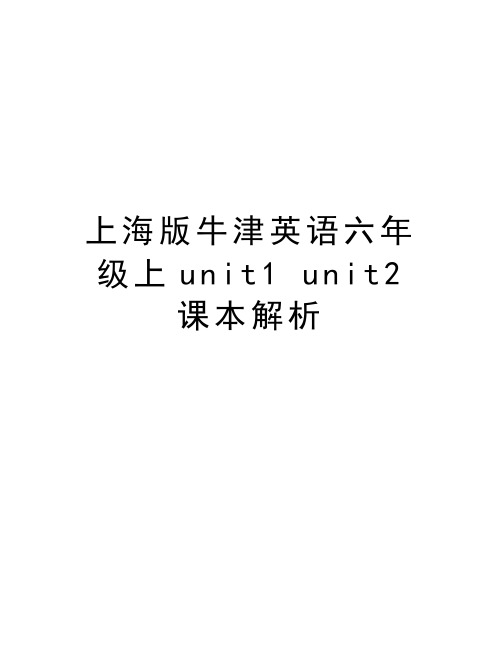
上海版牛津英语六年级上u n i t1u n i t2课本解析1.Alice has got a lot of presents and birthday cards from her family andrelatives.(1)...have got... I think I have got one.现在完成时结构have got在口语中相当于一般现在时have的意义,表示“有”。
不过,在美国英语中常用have,而在英国英语中则常用have got。
他有一个兄弟。
He has got a brother.(英式)=He has a brother.(美式)◆现在完成时结构只有一种疑问方式,即:Have/Has...got...?◆而一般现在时结构有两种疑问方式,即:Do/Does...have...?或Have /Has...?你有一把雨伞吗?①Have you got an umbrella?②Do you have an umbrella?③Have you an umbrella?注意这两种结构疑问句的回答略有不同。
①—Have you got a dictionary?—Yes,I have./No,I haven't.②—Do you have a dictionary?—Yes,I do./No,Idon't.考点链接1.Do you have a motorbike?(同义句)→ you a motorbike?2.I don't have a mobile phone like that.→I a mobile phone like that.(2) a lot of = lots of +可数名词复数/不可数名词I have a lot of friends.= I have lots of friends.There is a lot of water in the glass . = There is lots of water in the glass.(3) 介词from2.How many uncles do you have?How many+可数名词复数+do/does+主语+have(how many在句首,名词复数跟着走)How many的用法:1)there be句型中主语的数量,如some,five,only one等提问时,如果是可数名词,不管是单是复都当复,因为说话人不知道具体的数量,而many只能接可数名词复数,所以be一定要用areHow many+可数名词复数+are there+地点或时间状语There is a book on the desk. How many books are there on the desk?There are seven days in a week. How many days are there in a week? How much的用法:1)询问事物的数量,接不可数名词How much milk isthere in the glass2)询问事物的重量 How much does the pig weigh?3)多少钱 How much is the eraser?4)询问数字计算的结果,相当于what. How much is three plus one?1. ____________ meat do you eat every week?2. ____________ students are there in your class?3.________ the pants? They’re 15 yuan.A.How many is B.How many are C.How m uch is D.How much are3.I usually go shopping with my aunt.(1) always 总是usually 通常often 经常sometimes有时候 never从不表示频率,在句中可看做是插入语。

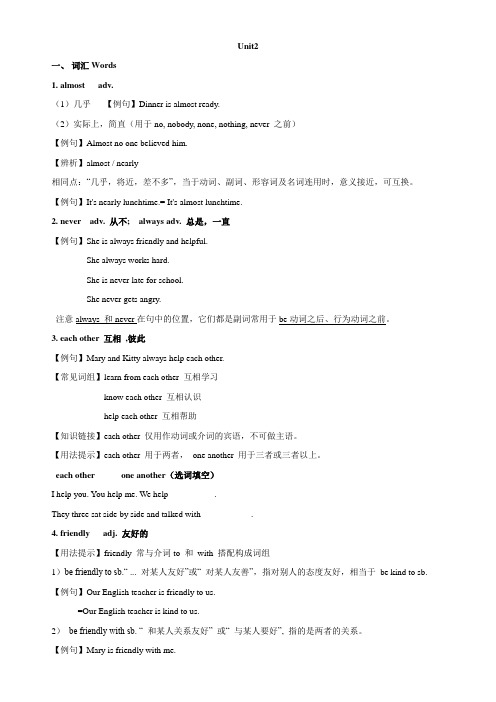
Unit2一、词汇Words1. almost adv.(1)几乎【例句】Dinner is almost ready.(2)实际上,简直(用于no, nobody, none, nothing, never 之前)【例句】Almost no one believed him.【辨析】almost / nearly相同点:“几乎,将近,差不多”,当于动词、副词、形容词及名词连用时,意义接近,可互换。
【例句】It's nearly lunchtime.= It's almost lunchtime.2. never adv. 从不; always adv. 总是,一直【例句】She is always friendly and helpful.She always works hard.She is never late for school.She never gets angry.注意always 和never在句中的位置,它们都是副词常用于be动词之后、行为动词之前。
3. each other 互相,彼此【例句】Mary and Kitty always help each other.【常见词组】learn from each other 互相学习know each other 互相认识help each other 互相帮助【知识链接】each other 仅用作动词或介词的宾语,不可做主语。
【用法提示】each other 用于两者,one another 用于三者或三者以上。
each other one another(选词填空)I help you. You help me. We help __________.They three sat side by side and talked with ___________.4. friendly adj. 友好的【用法提示】friendly 常与介词to 和with 搭配构成词组1)be friendly to sb.“ ... 对某人友好”或“ 对某人友善”,指对别人的态度友好,相当于be kind to sb. 【例句】Our English teacher is friendly to us.=Our English teacher is kind to us.2)be friendly with sb. “ 和某人关系友好” 或“ 与某人要好”, 指的是两者的关系。
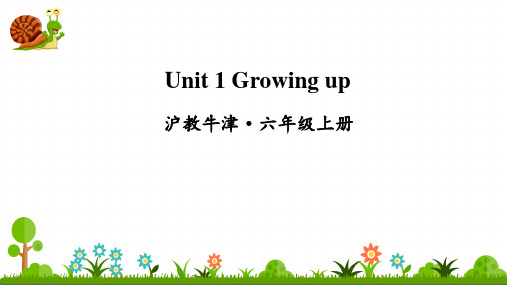

知识APleaSUre GroUP OffiCe [T985AB-B866SYT-B182C-BS682T-STT18]MOdUIe 1 FamiIy and friendsUnit 1 Family and relatives1. family and relatives家庭和亲戚 2. a family tree —个家谱3. grandsons and granddaughters 孙子和孙女们/夕卜孙和外孙女们得到许多礼物 从某人那儿得到一张生曰卡 我的家庭成员之一仅仅有一个阿姨 我的同班同学 去购物 其他什么 打羽毛球去骑自行车去游泳两个堂/表兄弟/妹多少…… 1. ThiS is my grandfather.这是我的(外)祖父。
TheSe are my family and relatives.这些是我的家人和亲戚。
4. get a IOt Of PreSentS5. HaPPy Birthday (to sb.) !6. get a birthday Card from sb.7. Olw Of my family members8. Only have One aunt9. my CIaSSmateS10. go ShOPPing11. What else 12. Play badminton 13. go CyCling 14. go SWimming 15. two COUSinS16. how many +名词复数语言点注意句中各成分保持单复数同形。
2. Im their son..我是他们的儿子。
Were their SonS•我们是他们的儿子。
3.HOW ITlany UnCIeS do you have 你有多少个叔叔HOW many后面接可数名词的复数形式。
4.What do you do Witll your…你和你的…干什么5.What else do you do WitlI your…你和你的…还干什么6.What else do you do WitII your...你和你的…还干什么With是个介词,后面接人称代词时,要用宾格的形式。

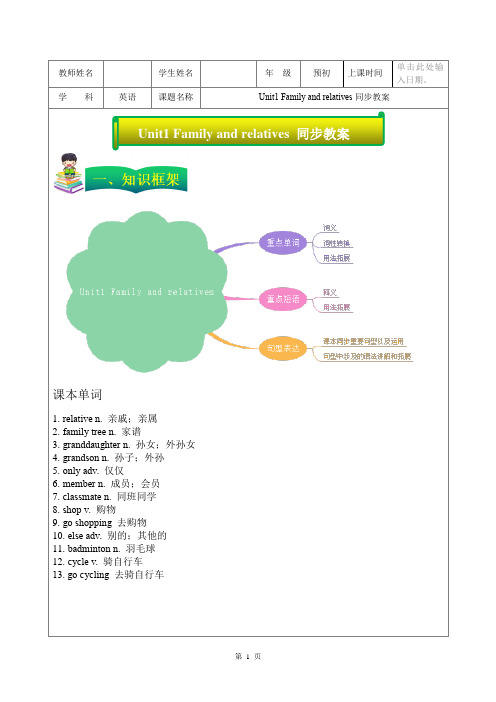
Unit1 Family and relatives 同步教案课本单词1.relative n. 亲戚;亲属2.family tree n. 家谱3.granddaughter n. 孙女;外孙女4.grandson n. 孙子;外孙5.only adv. 仅仅6.member n. 成员;会员7.classmate n. 同班同学8.shop v. 购物9.go shopping 去购物10.else adv. 别的;其他的11.badminton n. 羽毛球12.cycle v. 骑自行车13. go cycling 去骑自行车Ⅰ. Important words and phrases:Words:I.重点词汇1.____________ n. 家庭n.家庭成员____________ 家谱2.____________ v. 骑自行车____________ n. 自行车____________ 去骑自行车一些户外活动或体育项目可用go+ v. ing 的形式来表达。
____________________ 去游泳3. _________ / _________ /_________ /__________/_________/_________ 等频度副词(频次渐少)在句中的位置关系:行为动词之后,系动词之前。
简称“行之前,系之后”如:He is always late for school.He sometimes goes to school by bus.4.____________ adv. “别的,其它的” 常与不定代词、疑问代词或否定代词或副词连用,并后置。
____________ 还有什么____________ 别的什么人而other 只能修饰名词,且放在名词前。
如:other people 别人;other things 其他东西5. ____________ n. 亲属;亲戚6. ____________ n. 孙子;外孙【记忆连接】grand --常用于构成复合名词,表示家族关系。

课题Unit1 Family and relatives基础知识梳理教学目的1.使学生能够基本掌握Unit1中的基础词汇并且能够进行一些词汇变形练习;2.帮助学生梳理常考考点。
教学内容Step1: Greetings & Free talkHow are you today? Is there something interesting or important this week?What have you learned in your school? (询问学校课程进度)Step2: Lead in—脑筋急转弯麒麟到了北极之后,会变成啥?【答案】冰麒麟(淇淋)Step3: Words and expressions.Ⅰ. Words1. relative n. 亲属;亲戚Do you have any relatives in Beijing? 你在北京有亲戚吗?2. family tree 家谱This is Alice's family tree. 这是艾丽斯的家谱。
3. grandson n. 孙子;外孙【联想】great-grandson n. 曾孙;曾外孙4. granddaughter n. 孙女;外孙女【联想】great-granddaughter n. 曾孙女;曾外孙女5. only adv.仅仅only常常用于表示限定。
如:Only three people live in this very big house.在这幢特别大的房子里就住着三口人。
Sam is only three months old. 萨姆只有三个月大。
6. member n. 成员;会员You are a member of your class. 你是你们班的一员。
【联想】family members 家庭成员7.*classmate n. 同班同学His brother is my classmate.他哥哥是我的同班同学。


1.Alice has got a lot of presents and birthday cards from her family and relatives.(1)...have?got...?I?think?I?have?got?one.现在完成时结构have?got在口语中相当于一般现在时have的意义,表示“有”。
不过,在美国英语中常用have,而在英国英语中则常用have?got。
?他有一个兄弟。
?He?has?got?a?brother.(英式)=He?has?a?brother.(美式)??◆现在完成时结构只有一种疑问方式,即:Have/Has...got...?◆而一般现在时结构有两种疑问方式,即:Do/Does...have...?或Have?/Has...???你有一把雨伞吗??①Have?you?got?an?umbrella??②Do?you?have?an?umbrella??③Have?you?an?umbrella????注?意?这两种结构疑问句的回答略有不同。
①—H ave?you?got?a?dictionary??—Yes,I?have./No,I?haven't.?②—Do?you?have?a?dictionary??—Yes,I?do./No,Idon't.??考点链接??1.Do?you?have?a?motorbike?(同义句)→??? ? you???? ?a?motorbike??2.I?don't?have?a?mobile?phone?like?that.→I? ????a?mobile?phone?like?that.?(2) a lot of = lots of +可数名词复数/不可数名词I have a lot of friends.= I have lots of friends.There is a lot of water in the glass . = There is lots of water in the glass.(3) 介词from2.How many uncles do you have?How many+可数名词复数+do/does+主语+have(how many在句首,名词复数跟着走)How many的用法:1)there be句型中主语的数量,如some,five,only one等提问时,如果是可数名词,不管是单是复都当复,因为说话人不知道具体的数量,而many只能接可数名词复数,所以be一定要用areHow many+可数名词复数+are there+地点或时间状语There is a book on the desk. How many books are there on the desk?There are seven days in a week. How many days are there in a week?How much的用法:1)询问事物的数量,接不可数名词How much milk is there in the glass2)询问事物的重量How much does the pig weigh?3)多少钱How much is the eraser?4)询问数字计算的结果,相当于what. How much is three plus one?1. ____________?meat do you eat every week?2. ____________ students are there in your class?3.________?the?pants??They’re?15?yuan.?A.How?many?is????????????????B.How?many?are????C.How?much?is??????? ?????????D.How?much?are3.I usually go shopping with my aunt.(1) always 总是usually 通常often 经常sometimes有时候never从不表示频率,在句中可看做是插入语。
Eg: He always does his homework carefully.I often go to my grandmother’s house in the weekends.(2) go + V-ing 去做某事go shopping 去购物go cycling 去骑车Go swimming 去游泳(3) with sb 和某人一起。
with后接人称代词时,用宾格形式with用法归纳“用……”表示使用工具,手段等。
例如:①We can walk with our legs and feet. 我们用腿脚行走。
②He writes with a pencil. 他用铅笔写。
“和……在一起”,表示伴随。
例如:①Can you go to the park with me? 你能和我一起去公园吗?②He often goes to the library with Jenny. 他常和詹妮一起去图书馆。
③She lives?with?her son. 她和儿子住在一起。
“与……”。
例如:I’d like to hav e a talk with you. 我很想和你说句话。
“关于,对于”,表示一种关系或适应范围。
例如:What’s wrong with your watch? 你的手表怎么了?“带有,具有”。
例如:①He’s a tall kid with short hair. 他是个长着一头短发的高个子小孩。
②They have no money with them. 他们没带钱。
“在……方面”。
例如:Kate helps me with my English. 凯特帮我学英语。
4.—— Have you been to Ocean Park yet?——Yes, I have already/just been to…/been there.No, I haven’t been to…/been there yet.already,just多用于肯定句中,ever,yet,never多用于疑问句和否定句中。
?.already意思是“已经”?①通常用于陈述句中(放在have和has的后面)?②也可用于疑问句,表示期望得到肯定的回答或表示惊异,此时already常在句末。
??She?has?already?found?her?bike.??Has?she?found?her?bike?already??她已经找到自行车了???yet用法?①yet可用于否定句,此时译为“还”;??I?haven’t?found?my?ruler?yet.???②也可以用于疑问句,译为“已经”(放在have和has的后面也可放在句末)???Have?you?found?your?ruler?yet?你已经找到尺子了吗?????just只用于陈述句意思是“刚才”(放在have和has的后面)???I?have?just?received?a?letter.???never用于否定句译为“从不”(放在have和has的后面)???I’ve?never?been?to?Beijing.??ever用于疑问句译曾经”(放在have,has的后面)? Have?you?ever?been?to?Beijing???????练习:根据汉语提示用适当词的合适形式填空。
??1.I?have??__________?finished?my?homework.我已经做完家庭作业了。
???2.He?______________?had?his?meal.他刚吃过饭。
???3.?_________???you ________??sung?this?English?song?你曾唱过这首英文歌吗????4.They?__________?started??_________??.他们还没有动身。
???5.We???____________???heard?of?it.我们从来没有听说过这件事。
???6.?The?plane??______________???arrived?.?飞机已经来了。
??7.?I?______________?been?to?the?post?office.?我刚才去邮局了。
???8.?Mary???_______________??been?to?the?Great?Wall.?玛丽从未去过长城。
have been to 来过,去过(人已经回来了)have gone to 去或到某地了(人还没回来)注意:遇到四个地点副词时,去掉to (here, there, home, abroad)练习:用have been to,have gone to 填空1)Where is Jim? He ______________ to Beijing.2) She has ________ to the park.She will be back in two hours.3) I have ________ to the West Lake. Look, I have taken many photos on it.4) The Whites have _______ to the USA.T hey won’t come back.5) I have ______ to Hong Kong twice.6) Tom has ______ to the WC, so I have to wait for him.7) How many times have you _______ to Shanghai.8) I like the Great Wall, so I have ______ there many times this month.9) Sally isn’t at home, she has ________ to Japan.10) The Blacks aren’t in Shanghai. They have ________ to Beijing together.短语:1. go shopping with my aunt 和我的阿姨去购物2.help each other 互相帮助3. be friendly to sb.对某人友好= be kind to sb4. be late for 迟到5. get angry 生气6.share her food with me 和我一起分享她的食物7.live in 住在8.ask sb about sth 询问某人关于某事ask sb to do sth 让某人做某事ask sb not to do sth 让某人不要做某事tell sb to do sth 告诉某人做某事tell sb not to do sth 告诉某人不要做某事promise to do sth 承诺做某事promise not to do sth 承诺不做某事9.What about (= how about)怎么样(加doing)10.talk about 谈论talk with sb 和某人谈话,talk to sb.和某人谈话11. keep the environment clean 保持环境干净12.look after 照顾(= take care of )13.discuss it with your classmates 和你的同学讨论。